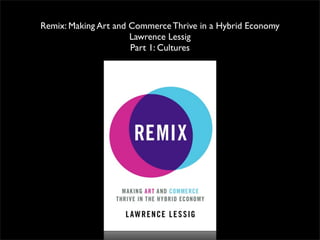Remixprez1
- 1. Remix: Making Art and Commerce Thrive in a Hybrid Economy Lawrence Lessig Part 1: Cultures
- 2. Preface ŌĆó Copyright is critically ŌĆó Copyright laws important to a healthy create the incentives culture. to produce great new works that otherwise ŌĆó Properly balanced, it is would not be produced essential to inspiring certain forms of creativity. ŌĆó ŌĆ£The inspiration for this book is the copyright wars, by which right - thinking sorts mean not the ŌĆ£warŌĆØ on copyright ŌĆ£wagedŌĆØ by ŌĆ£piratesŌĆØ but the ŌĆ£warŌĆØ on ŌĆ£piracy,ŌĆØ which ŌĆ£threatensŌĆØ the ŌĆ£survivalŌĆØ of certain important American industries. (xv)ŌĆØ
- 3. Copyright Wars ŌĆó Not actual con’¼éicts of survival ŌĆó Wars of survival for certain businesses and business models ŌĆó Other values are affected by this war ŌĆó ŌĆ£We must make sure this war doesnŌĆÖt cost more than it is worth. We must be sure it is winnable, or winnable at a price weŌĆÖre willing to pay. (xvi)ŌĆØ ŌĆó Technology enables us to create and spread creative work differently from how it was created and spread before ŌĆó ŌĆ£What kind of moral platform will sustain our kids, when their ordinary behaviour is deemed criminal? Who will they become? (xvii)ŌĆØ
- 4. John Philip Sousa ŌĆó Famous American ŌĆó He was not entitled to composer any royalties from his recordings ŌĆó Known for his marches; Washington Post and Stars and Stripes ŌĆó Companies that sold Forever recorded versions of songs were not required to pay the songwriters ŌĆó 1906 testi’¼üed before Congress to complain about the existing ŌĆó Sousa considered this a form of piracy copyright laws
- 5. Shifting Cultures ŌĆó A move from local ŌĆó Sousa did not like amateur sub- cultures to a centralized concept of highly produced recorded music authoritative culture ŌĆó He feared a ŌĆó the distinction between centralized the culture that Sousa commercially produced feared and the one that he and controlled music embraced as; culture Read Only culture and Read Write culture
- 6. Read/Only Culture ŌĆó When a society is ŌĆ£less practiced in performance, or amateur creativity, and more ŌĆó RCA corporation -Viacom comfortable with simple consumption. (28)ŌĆØ ŌĆó Control ŌĆó Production ŌĆó Distribution ŌĆó Platform
- 7. Read/Write Culture ŌĆó When ŌĆ£ordinary citizens ŌĆ£readŌĆØ their culture by listening to it or by ŌĆó Linux - Wikipedia reading representations of it. They add to the ŌĆó ŌĆ£The code that built the culture they read by Net came from a sharing creating and re-creating economy. (163)ŌĆØ the culture around them. (28)ŌĆØ ŌĆó Collaboration ŌĆó Remix Culture
- 8. Cultures Compared ŌĆó Amateur vs. Professional ŌĆó The balance that existed between Read Only and Read Write culture, has ŌĆó Values been altered ŌĆó Education ŌĆó The internet has created a a cultural shift towards ŌĆó Money a Read Write society ŌĆó The Purpose of Law ŌĆó Further implications
- 9. Context ŌĆó Fundamental Concepts of the Digital Age - Legal and Cultural ŌĆó The Language of New Media - Lev Manovich ŌĆó Hybrid creativity - Hybrid economies ŌĆó Building on History and Theory - Computing and Networking - Creativity and Commerce ŌĆó Recent legislation is an attempt to reconcile differences between the Read Write Culture and the earlier Read Only culture
- 10. Questions ŌĆó Can you think of examples of some read/write or read only cultures? Can you think of any instances of a clash of these two cultural interests? ŌĆó Is there an inherent con’¼éict between read/only and read/ write cultures? ŌĆó What should law makers do? What kinds of laws could be written in an attempt to create a balanced and fair intellectual property system for the digital age?









